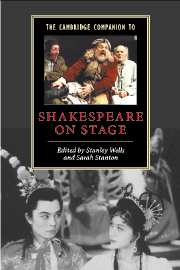Book contents
- Frontmatter
- 1 Shakespeare plays on Renaissance stages
- 2 Improving Shakespeare: from the Restoration to Garrick
- 3 Romantic Shakespeare
- 4 Pictorial Shakespeare
- 5 Reconstructive Shakespeare: reproducing Elizabethan and Jacobean stages
- 6 Twentieth-century performance: the Stratford and London companies
- 7 The tragic actor and Shakespeare
- 8 The comic actor and Shakespeare
- 9 Women and Shakespearean performance
- 10 International Shakespeare
- 11 Touring Shakespeare
- 12 Shakespeare on the political stage in the twentieth century
- 13 Shakespeare in North America
- 14 Shakespeare on the stages of Asia
- 15 Shakespeare and Africa
- Further reading
- Index
15 - Shakespeare and Africa
Published online by Cambridge University Press: 28 May 2006
- Frontmatter
- 1 Shakespeare plays on Renaissance stages
- 2 Improving Shakespeare: from the Restoration to Garrick
- 3 Romantic Shakespeare
- 4 Pictorial Shakespeare
- 5 Reconstructive Shakespeare: reproducing Elizabethan and Jacobean stages
- 6 Twentieth-century performance: the Stratford and London companies
- 7 The tragic actor and Shakespeare
- 8 The comic actor and Shakespeare
- 9 Women and Shakespearean performance
- 10 International Shakespeare
- 11 Touring Shakespeare
- 12 Shakespeare on the political stage in the twentieth century
- 13 Shakespeare in North America
- 14 Shakespeare on the stages of Asia
- 15 Shakespeare and Africa
- Further reading
- Index
Summary
Shakespeare's work reached Africa no later than it reached the most distant parts of his own country. In 1607 there are reports of performances of Hamlet and Richard II by British sailors off the coast of Sierra Leone. This hardly raised the floodgates of performance, but in 1800 the African Theatre – an amateur theatre set up in Cape Town, South Africa, by the soldiers of the British garrison – opened with a performance of I Henry IV, and since then the amateur entertainments of colonial officers, the educational priorities of missionary and colonial government schools, plus tours of professional actors from Britain to South Africa from the early nineteenth century and throughout Africa from the mid-twentieth century onwards, ensured that the plays of Shakespeare – played in English (and in the nineteenth century often adapted, in the tradition of the times, to make them more acceptable to contemporary tastes) – had a significant presence. But Shakespeare – perhaps more pertinently for our interests in this chapter – has also been performed and explored through the medium of translation and adaptation in a range of African languages and performance cultures. Macbeth, The Merchant of Venice, The Tempest and Julius Caesar have all been translated into Kiswahili – a language spoken extensively throughout East Africa – perhaps most interestingly by the distinguished statesman Julius Nyerere, who was the first president of independent Tanzania. Nyerere, a Shakespeare enthusiast, seems to have undertaken his translations in the 1960s, initially as a celebration of the richness and beauty of the Kiswahili language, showing – with a clear ideological purpose – that the major indigenous language of the new nations of East Africa was every bit as sophisticated as the language of the world’s greatest poet.
- Type
- Chapter
- Information
- The Cambridge Companion to Shakespeare on Stage , pp. 284 - 299Publisher: Cambridge University PressPrint publication year: 2002
- 1
- Cited by



